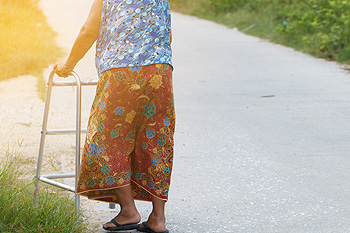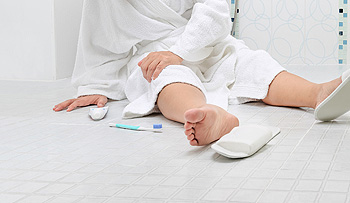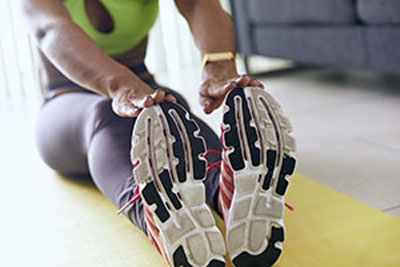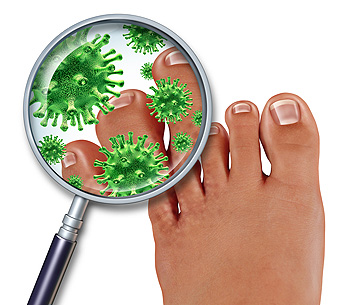
 Elderly people may experience a certain amount of instability, which may lead to falling. This unnatural movement has the potential of causing serious health ailments. Many patients who have fallen have developed a fear of falling, and this may prevent them from being as active as they once were. This may possibly cause the body to lose strength and flexibility. There are methods that can be implemented which may help to reduce the risk of falling. These can consist of increasing the lighting in the household, installing grab bars in the toilet and shower areas, and removing any existing loose carpeting. Research has indicated it may be beneficial to have a routine physical examination, and this may be helpful in determining the effectiveness of current medications. If you would like additional information about how falling can affect the feet, it is suggested that you consult with a podiatrist.
Elderly people may experience a certain amount of instability, which may lead to falling. This unnatural movement has the potential of causing serious health ailments. Many patients who have fallen have developed a fear of falling, and this may prevent them from being as active as they once were. This may possibly cause the body to lose strength and flexibility. There are methods that can be implemented which may help to reduce the risk of falling. These can consist of increasing the lighting in the household, installing grab bars in the toilet and shower areas, and removing any existing loose carpeting. Research has indicated it may be beneficial to have a routine physical examination, and this may be helpful in determining the effectiveness of current medications. If you would like additional information about how falling can affect the feet, it is suggested that you consult with a podiatrist.
Preventing falls among the elderly is very important. If you are older and have fallen or fear that you are prone to falling, consult with the podiatrists from The Foot & Ankle Center of New Jersey. Our doctors will assess your condition and provide you with quality advice and care.
Every 11 seconds, an elderly American is being treated in an emergency room for a fall related injury. Falls are the leading cause of head and hip injuries for those 65 and older. Due to decreases in strength, balance, senses, and lack of awareness, elderly persons are very susceptible to falling. Thankfully, there are a number of things older persons can do to prevent falls.
How to Prevent Falls
Some effective methods that older persons can do to prevent falls include:
Falling can be a traumatic and embarrassing experience for elderly persons; this can make them less willing to leave the house, and less willing to talk to someone about their fears of falling. Doing such things, however, will increase the likelihood of tripping or losing one’s balance. Knowing the causes of falling and how to prevent them is the best way to mitigate the risk of serious injury.
If you have any questions, please feel free to contact our office located in Paramus, NJ . We offer the newest diagnostic and treatment technologies for all your foot care needs.
 Recent studies that have been conducted in the United Kingdom indicate approximately half of pregnant women are influenced by society to keep up with the latest fashion trends. This consists of choosing to wear inappropriate shoes that include high heels and flip flops during the majority of their pregnancy. When these types of shoes are frequently worn, the risk of falling may increase. This may be a result of hormonal changes that occur within the body, causing the ligaments and muscles to stretch and become soft. Pregnant women may feel more secure when flip flops are avoided, and shoes with a lower heel are worn. It is beneficial to choose shoes that have the proper amount of cushioning, as this is often helpful in providing adequate support. If you would like additional information about how to choose the correct shoes to be worn during pregnancy, please consult with a podiatrist.
Recent studies that have been conducted in the United Kingdom indicate approximately half of pregnant women are influenced by society to keep up with the latest fashion trends. This consists of choosing to wear inappropriate shoes that include high heels and flip flops during the majority of their pregnancy. When these types of shoes are frequently worn, the risk of falling may increase. This may be a result of hormonal changes that occur within the body, causing the ligaments and muscles to stretch and become soft. Pregnant women may feel more secure when flip flops are avoided, and shoes with a lower heel are worn. It is beneficial to choose shoes that have the proper amount of cushioning, as this is often helpful in providing adequate support. If you would like additional information about how to choose the correct shoes to be worn during pregnancy, please consult with a podiatrist.
Pregnant women with swollen feet can be treated with a variety of different methods that are readily available. For more information about other cures for swollen feet during pregnancy, consult with the podiatrists from The Foot & Ankle Center of New Jersey. Our doctors will attend to all of your foot and ankle needs.
What Foot Problems Can Arise During Pregnancy?
One problem that can occur is overpronation, which occurs when the arch of the foot flattens and tends to roll inward. This can cause pain and discomfort in your heels while you’re walking or even just standing up, trying to support your baby.
Another problem is edema, or swelling in the extremities. This often affects the feet during pregnancy but tends to occur in the later stages.
How Can I Keep My Feet Healthy During Pregnancy?
If you have any questions please feel free to contact our office located in Paramus, NJ . We offer the newest diagnostic and treatment technologies for all your foot and ankle needs.
Many people spend the majority of their working day standing for extended periods of time. Research has indicated it is beneficial to perform specific types of stretches that can strengthen the muscles in the feet and legs. An effective calf stretch begins with standing against a wall, and extending one leg at a time in a backward direction, while standing flat on the floor. Additionally, it is helpful to wear shoes that fit correctly, and provide adequate support. Wearing socks that fit properly can be instrumental in keeping the feet dry, and preventing blisters. High heels should be avoided, and this may be helpful in preventing an Achilles tendon injury from occurring. If you are interested in obtaining additional information about how to choose shoes while working on your feet, it is suggested that you consult with a podiatrist.
While working on the feet, it is important to take the proper care of them. For more information about working on your feet, contact the podiatrists from The Foot & Ankle Center of New Jersey. Our doctors will treat your foot and ankle needs.
Working on Your Feet
Standing on your feet for long periods of time can cause stress and pain in your feet. Your whole body may experience change in terms of posture, back pain, bunions, callouses and or plantar warts. There are ways to avoid these conditions with proper foot care, smart choices and correct posture.
Positive Changes
Negative heeled shoe – Choosing this shoe type places the heel slightly lower than the ball of the foot. These are great for overall foot health. Find shoes that fit you correctly.
Go barefoot – Our feet were not designed to be enclosed for all hours of the day. Try to periodically expose your feet to air.
Eliminate Pain
Foot Exercises – Performing simple exercises, incorporating yoga and doing stretches are beneficial. This will allow increased blood flow to the area and muscles of the foot.
Achilles tendon – Stretching the foot out flat on the floor will relax the calf muscles and tendon. These exercises can be performed almost anywhere. Make sure you add these exercises to your daily regimen.
With a little bit of this information and knowing more about foot health, you will notice changes. Foot stretches and proper footwear will help with pain and prevent further issues.
If you have any questions please feel free to contact our office located in Paramus, NJ . We offer the newest diagnostic and treatment technologies for all your foot and ankle needs.
The Achilles tendon connects the heel to the calf muscles, and it is located in the back of the leg, directly above the heel. It is known to be the largest tendon in the body, and if it should become injured, it may be difficult to walk and run. This tendon enables the foot to point and flex, in addition to standing on tiptoe. There are noticeable symptoms that exist if an Achilles tendon injury has occurred. These can include severe pain in the back of the leg, the inability to bend the foot, and some patients may also notice the ankle is bruised and weak. As the aging process occurs, it is important to perform proper stretches that can keep the Achilles tendon strong, and this may be helpful in preventing a painful injury from occurring. It can become torn or injured if you suddenly step off of a curb, which may overstretch the tendon. Moderate relief may be found when the affected foot is elevated, and it may feel comforting if an elastic bandage is wrapped around the foot to provide additional support. If you have injured your Achilles tendon, it is advised that you consult with a podiatrist who can properly treat this condition.
Achilles tendon injuries need immediate attention to avoid future complications. If you have any concerns, contact the podiatrists of The Foot & Ankle Center of New Jersey. Our doctors can provide the care you need to keep you pain-free and on your feet.
What Is the Achilles Tendon?
The Achilles tendon is a tendon that connects the lower leg muscles and calf to the heel of the foot. It is the strongest tendon in the human body and is essential for making movement possible. Because this tendon is such an integral part of the body, any injuries to it can create immense difficulties and should immediately be presented to a doctor.
What Are the Symptoms of an Achilles Tendon Injury?
There are various types of injuries that can affect the Achilles tendon. The two most common injuries are Achilles tendinitis and ruptures of the tendon.
Achilles Tendinitis Symptoms
Rupture Symptoms
Treatment and Prevention
Achilles tendon injuries are diagnosed by a thorough physical evaluation, which can include an MRI. Treatment involves rest, physical therapy, and in some cases, surgery. However, various preventative measures can be taken to avoid these injuries, such as:
If you have any questions please feel free to contact our office located in Paramus, NJ . We offer the newest diagnostic tools and technology to treat your foot and ankle needs.
 Many diabetic patients are aware of the importance of taking care of their feet. This typically includes looking for existing cuts, scrapes, or wounds on the soles of the feet. It is crucial to the health of the patient that any infection on the feet is avoided. Neuropathy is a common ailment among diabetic patients, and this condition limits the ability to feel if a cut is present. If it goes unnoticed, an infection may occur, and this can possibly lead to a foot ulcer. If there are wounds on the feet, it is important to frequently elevate them, as this may be helpful in reducing any existing swelling. If you are diabetic, it is important to be under the care of a podiatrist who can help you to properly manage your diabetic condition.
Many diabetic patients are aware of the importance of taking care of their feet. This typically includes looking for existing cuts, scrapes, or wounds on the soles of the feet. It is crucial to the health of the patient that any infection on the feet is avoided. Neuropathy is a common ailment among diabetic patients, and this condition limits the ability to feel if a cut is present. If it goes unnoticed, an infection may occur, and this can possibly lead to a foot ulcer. If there are wounds on the feet, it is important to frequently elevate them, as this may be helpful in reducing any existing swelling. If you are diabetic, it is important to be under the care of a podiatrist who can help you to properly manage your diabetic condition.
Diabetic foot care is important in preventing foot ailments such as ulcers. If you are suffering from diabetes or have any other concerns about your feet, contact the podiatrists from The Foot & Ankle Center of New Jersey. Our doctors can provide the care you need to keep you pain-free and on your feet.
Diabetic Foot Care
Diabetes affects millions of people every year. The condition can damage blood vessels in many parts of the body, especially the feet. Because of this, taking care of your feet is essential if you have diabetes, and having a podiatrist help monitor your foot health is highly recommended.
The Importance of Caring for Your Feet
Patients with diabetes should have their doctor monitor their blood levels, as blood sugar levels play such a huge role in diabetic care. Monitoring these levels on a regular basis is highly advised.
It is always best to inform your healthcare professional of any concerns you may have regarding your feet, especially for diabetic patients. Early treatment and routine foot examinations are keys to maintaining proper health, especially because severe complications can arise if proper treatment is not applied.
If you have any questions please feel free to contact our office located in Paramus, NJ . We offer the newest diagnostic and treatment technologies for all your foot and ankle needs.
 Many pregnant women often notice that their feet are swollen. Hormone changes can play a significant role in developing swollen feet, in addition to the weight that is gained. Swelling may increase as the due date approaches and may be especially uncomfortable in warmer weather. If the swelling is mild, there’s typically no reason to be concerned. Some pregnant women have found methods that can reduce swelling, such as lying on the left side while sleeping, and drinking plenty of fresh water. It may also help to elevate the feet frequently during the day. Stretching regularly may also be beneficial in reducing swollen ankles and feet. If you would like more information about how to manage swollen feet during pregnancy, speak to your local podiatrist.
Many pregnant women often notice that their feet are swollen. Hormone changes can play a significant role in developing swollen feet, in addition to the weight that is gained. Swelling may increase as the due date approaches and may be especially uncomfortable in warmer weather. If the swelling is mild, there’s typically no reason to be concerned. Some pregnant women have found methods that can reduce swelling, such as lying on the left side while sleeping, and drinking plenty of fresh water. It may also help to elevate the feet frequently during the day. Stretching regularly may also be beneficial in reducing swollen ankles and feet. If you would like more information about how to manage swollen feet during pregnancy, speak to your local podiatrist.
Pregnant women with swollen feet can be treated with a variety of different methods that are readily available. For more information about other cures for swollen feet during pregnancy, consult with the podiatrists from The Foot & Ankle Center of New Jersey. Our doctors will attend to all of your foot and ankle needs.
What Foot Problems Can Arise During Pregnancy?
One problem that can occur is overpronation, which occurs when the arch of the foot flattens and tends to roll inward. This can cause pain and discomfort in your heels while you’re walking or even just standing up, trying to support your baby.
Another problem is edema, or swelling in the extremities. This often affects the feet during pregnancy but tends to occur in the later stages.
How Can I Keep My Feet Healthy During Pregnancy?
If you have any questions please feel free to contact our office located in Paramus, NJ . We offer the newest diagnostic and treatment technologies for all your foot and ankle needs.
 The sport of running is known to be therapeutic and enjoyable. Research has indicated there are methods which can be implemented which may prevent painful running injuries. When the legs and feet are warmed up, the muscles become flexible, and can be less prone to having an injury occur. This can be accomplished by performing leg swings. It is beneficial to perform this type of stretch by standing on one leg, and swinging the other leg forward and backward. This can be instrumental in developing strength. It is helpful to run with a specific reason in mind, which can vary from running up and down hills to running on smooth pavement. This awareness may prevent running injuries by focusing on what type of steps are being taken. Additionally, it helps the body to run in small increments on a daily basis, and this may help to keep the body limber. If you would like additional information about how to prevent running injuries, please schedule a consultation with a podiatrist.
The sport of running is known to be therapeutic and enjoyable. Research has indicated there are methods which can be implemented which may prevent painful running injuries. When the legs and feet are warmed up, the muscles become flexible, and can be less prone to having an injury occur. This can be accomplished by performing leg swings. It is beneficial to perform this type of stretch by standing on one leg, and swinging the other leg forward and backward. This can be instrumental in developing strength. It is helpful to run with a specific reason in mind, which can vary from running up and down hills to running on smooth pavement. This awareness may prevent running injuries by focusing on what type of steps are being taken. Additionally, it helps the body to run in small increments on a daily basis, and this may help to keep the body limber. If you would like additional information about how to prevent running injuries, please schedule a consultation with a podiatrist.
Exercising your feet regularly with the proper foot wear is a great way to prevent injuries. If you have any concerns about your feet, contact the podiatrists of The Foot & Ankle Center of New Jersey. Our doctors will treat your foot and ankle needs.
How to Prevent Running Injuries
Many common running injuries are caused by overuse and overtraining. When the back of the kneecap starts wearing out and starts causing pain in your knee, this is commonly referred to as runner’s knee. Runner’s knee is a decrease in strength in your quadriceps and can occur if you’re not wearing properly fitted or supporting shoes. To prevent runner’s knee, focusing on hip strengthening is a good idea, as well as strengthening your quads to keep the kneecaps aligned.
What Are Some Causes of Running Injuries?
- One cause of a common running injury is called iliotibial band syndrome.
- Plantar fasciitis is also another common injury.
- Stress fractures can occur from overtraining, lack of calcium, or even your running style.
Best Ways to Prevent Running Injuries
- Wear footwear that fits properly and suits your running needs.
- Running shoes are the only protective gear that runners have to safeguard them from injury.
- Make a training schedule. Adding strengthening exercises as well as regular stretching can help keep you strong and limber and can lessen the possibility of injuries.
- Stretching keeps muscles limber; this will help you gain better flexibility.
If you have any questions please feel free to contact our office located in Paramus, NJ . We offer the newest diagnostic and treatment technologies for all your foot and ankle needs.
 Toenail fungus is an infection that forms underneath toenails. When this occurs, the nail usually darkens and may begin to smell. This infection can spread to other nails or skin, so it is important to treat it. Over time, the toenail might begin to thicken and the infection might become painful. Thankfully, there are ways to prevent toenail fungus. Proper foot hygiene is the first step in preventing infection. Washing your feet and making sure to fully dry them will help keep infectious organisms out of your toenails. In public areas, wear shower shoes and avoid wearing shoes or socks that trap excessive moisture, because damp environments allow infections to thrive. It is also important to cut your toenails straight across and to make sure any pedicure tools used on your feet are clean. If you would like more information on how to properly prevent toenail fungus, then it is recommended you consult with a podiatrist.
Toenail fungus is an infection that forms underneath toenails. When this occurs, the nail usually darkens and may begin to smell. This infection can spread to other nails or skin, so it is important to treat it. Over time, the toenail might begin to thicken and the infection might become painful. Thankfully, there are ways to prevent toenail fungus. Proper foot hygiene is the first step in preventing infection. Washing your feet and making sure to fully dry them will help keep infectious organisms out of your toenails. In public areas, wear shower shoes and avoid wearing shoes or socks that trap excessive moisture, because damp environments allow infections to thrive. It is also important to cut your toenails straight across and to make sure any pedicure tools used on your feet are clean. If you would like more information on how to properly prevent toenail fungus, then it is recommended you consult with a podiatrist.
For more information about treatment, contact the podiatrists of The Foot & Ankle Center of New Jersey. Our doctors can provide the care you need to keep you pain-free and on your feet.
Toenail Fungus Treatment
Toenail fungus is a condition that affects many people and can be especially hard to get rid of. Fortunately, there are several methods to go about treating and avoiding it.
Antifungals & Deterrence
Oral antifungal medicine has been shown to be effective in many cases. It is important to consult with a podiatrist to determine the proper regiment for you, or potentially explore other options.
Applying foot powder on the feet and shoes helps keep the feet free of moisture and sweat.
Sandals or open toed shoes – Wearing these will allow air movement and help keep feet dry. They also expose your feet to light, which fungus cannot tolerate. Socks with moisture wicking material also help as well.
If you have any questions please feel free to contact our office located in Paramus, NJ . We offer the newest diagnostic tools and technology to treat your foot and ankle needs.